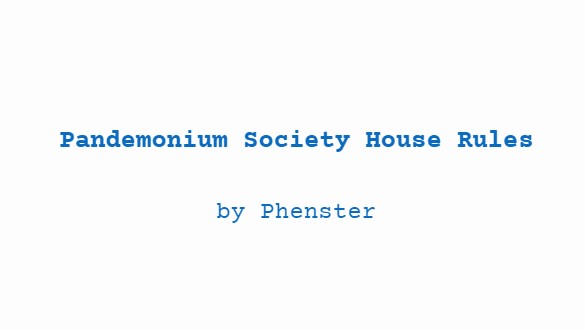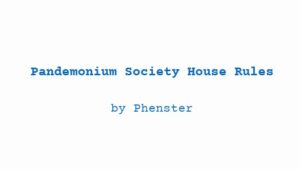“Saving Throw VS. Death,” the previous article in the series, wrapped up the Pandemonium Society’s house rules for combat, as published in various issues of the newsletters L’avant garde and Paradigm Lost. We jumped around issue numbers to talk about the combat rules in a coherent manner. Now, it makes sense to take the remaining house rules by book-order, that is, in the order as the rules they modify appear in Holmes.
So, we start here with ability scores, and we’ll end with treasure, which seems appropriate for such an adventure. For, an adventure it is. It may be of the there-and-back-again sort, but Phenster’s contributions to the newsletters from 1980 to 87 are numerous. Between here and there, we have some monsters to fight before we can take the treasure.
This is the 19th in a continuing series of articles, which reedits house rules for Holmes Basic D&D from 40-year-old game club newsletters. Mentions of house rules are in bold text and followed by a [bracketed category designator].
For rules category descriptions and more about the newsletters, see “About the Reedition of Phenster’s.” For an index of articles, see Coming Up in “Pandemonium Society House Rules.”
Phenster’s Pandemonium Society House Rules is a work of fiction. Names, characters, businesses, events, incidents, and newsletters are either products of the author’s imagination or are used in a fictitious manner. Any resemblance to actual persons, living or dead, or actual events is pure coincidence.
Additions to Ability Scores
The guys at the Game Hoard talk a lot about the ability adjustments[1] they have from high scores in their A(dvanced) D&D games. They get pluses to lots of stuff, like +3 to saving throws for WIS, −4 on AC for an 18 DEX, and bonuses to hit AND damage for STR. They even get "extra strength" (fighters only) that can give them as high as +6!!
We think it's more fun to have bonuses for more high scores besides CON and DEX like in the rules, but according to Hazard we have to be careful of "power creep," or it makes the game too easy. So, Mandykin and Tombs worked out some extra bonuses that Hazard said was OK for his "Great Halls" campaign.
—from Paradigm Lost: the Newsletter of the Pandemonium Society of Neighborhood Dungeons and Dragons Players, #2 (November 1980)
Following this introduction, Phenster provides a table showing modifiers for Strength, Wisdom, Dexterity, and Charisma. I reproduce the table below, adding Constitution and the full Dexterity entry from Basic D&D (1977, 6) plus a couple rows for Intelligence (9) for completeness. Note that rule-smiths Mandykin and Tombs in some cases add bonuses without corresponding penalties.
Power creep aside, while I don’t agree that they make the game too easy, I do think AD&D’s bonuses—similar to those introduced in OD&D’s Greyhawk supplement (1976)—are over-complicated for Holmes. Conversely, Moldvay’s Basic (1981) bonuses and penalties for ability scores are too elegant. Neither has the Holmes spirit we wish to preserve.
Ability Score Bonuses and Penalties [E]
| Ability | Score | Bonus/Penalty |
|---|---|---|
| Strength | 18 | +3 attack, damage, force doors |
| 17 | +2 | |
| 15-16 | +1 | |
| 7-14 | None | |
| 6 or less | −1 | |
| Intelligence | 11-18 | 1-8 additional languages |
| 10 or less | None | |
| Wisdom | 15 or more | +1 magic saves |
| 14 or less | None | |
| Constitution | 18 | +3 hit points per hit dice |
| 17 | +2 | |
| 15-16 | +1 | |
| 7-14 | None | |
| 6 or less | −1 | |
| Dexterity | 15 or more | −1 armor class |
| 13 or more | +1 missile fire | |
| 9-12 | None | |
| 8 or less | −1 missile fire | |
| Charisma | 18 | Up to 12 hirelings; +3 loyalty2 |
| 17 | 10; +2 | |
| 13-16 | 6-9; +1 | |
| 7-12 | 5 | |
| 6 or less | 4; −1 |
1 From the context, I assume Phenster intends “ability score modifiers.”
2 Phenster covers loyalty in an article about henchmen, which we’ll get to. For now, we note that loyalty, for the Pandemonium Society, is not the same as morale.


Pingback: Pandemonium Society House Rules – DONJON LANDS
Pingback: Regular Entourage: Hirelings and Henchmen – DONJON LANDS
Pingback: Models for Languages in Make-Believe Worlds – DONJON LANDS